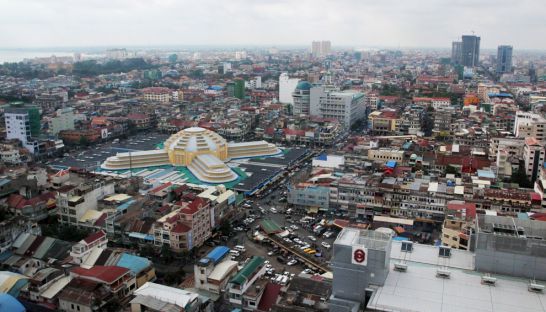Cambodia: Business barometer falls as political uncertainty looms
Business confidence among companies operating in Cambodia has dropped to its lowest level in years on the perceived decline in political stability and anxiety over next year’s general elections, and will likely cool investor appetite for the foreseeable future, according to a new survey by ANZ Royal Bank.
The ANZ Royal Business Confidence Index, a benchmark that takes its data from businesses surveyed across the industry, agriculture and services sectors, rated overall business confidence in Cambodia at 76 out of 100, down seven points compared to last year’s survey.
“The overall score of business confidence for the next 12 months dropped to the lowest point of all waves of the study,” according to the report, which has been published annually since 2014.
“The decline of overall confidence could derive from the increasing competition in the market, perceived political instability and the uncertainty of the coming elections, deterring business from investments in the near term,” it added.
The overall drop in confidence was weighted heavily by two-thirds of businesses surveyed, primarily small- and medium-sized enterprises (SMEs), reporting that they expected lower volumes of revenue growth compared to previous years, with the exception of the agricultural sector, which showed renewed vigour.
Large-scale businesses, which raised the same concerns as SMEs, however reported little change in confidence, something the report attributed to well-established business planning.
While the survey noted that there were some positive indicators in expected turnover and business growth due to ongoing performance that secures room for future expansion, these points were muted by political concerns. Companies also reported that they did not foresee expanding existing investments to scale up potential on fears of a loss of consumer sentiment.
However, key drivers for business growth largely remained the same with regards to access to a low-cost labour force and improved tax-collection initiatives that were perceived as levelling the playing field by targeting those that garnered unfair advantages by underpaying their obligations.
Corruption once again remained the key issue for businesses, while a lack of infrastructure, quality of education and the high cost of utilities that incur a heavy cost for operations were also a concern for those surveyed.
David Totten, director of Emerging Markets Consulting, said that while the report showed that the majority of barriers had been reduced significantly, it was hard to reconcile the overall drop in confidence, especially among the SME sector.
“The interesting question is, therefore, what the reasons for their lower confidence and income and growth expectations are, relative to larger corporations?” he said yesterday.
“Economic policymakers in many countries strive for a robust SME sector to generate economic growth. So, based on this data, a downturn in SME confidence is not a positive indicator.”
David Van, local managing director of the Bower Group Asia, said that downturn in confidence should be expected as long as pre-election jitters prevail.
“It’s been common practice in Cambodia that during every preelectoral cycle, businesses, whether local or foreign, tend to go at a slower pace as the public is watching with concern the tension rising, [with] public protests in the past and expected in the upcoming electoral period,” he said.
The report also noted that since the ASEAN Economic Community (AEC) was launched in late 2015, businesses perceived that the regional economic bloc’s inclusive impacts, with cross-border benefits, and increased risk from competition, had failed to materialise as anticipated.
Van said that while the AEC had been hyped by governments as promoting a more liberal trade environment, it has not served as the game changer it was billed as.
“It’s well known also that only the more-developed ASEAN member states would benefit from the AEC concept of freer movement of goods and services, but less-developed member states with weak regulatory framework like Cambodia, Laos or Myanmar would still struggle hard,” he said.
Sophal Ear, an associate professor of world affairs at Occidental College in Los Angeles, said that it was no surprise that politics have caused business sentiment to turn for the worse.
“It’s not just political uncertainty with the upcoming elections that has eroded high levels of business confidence,” he said. “It’s the arbitrary and capricious political environment in which no dissent will be brooked.”
He added that businesses “need customers who are happy and buying, not customers who are angry and afraid”.
Source: http://www.phnompenhpost.com/business/business-barometer-falls-political-uncertainty-looms


 English
English




